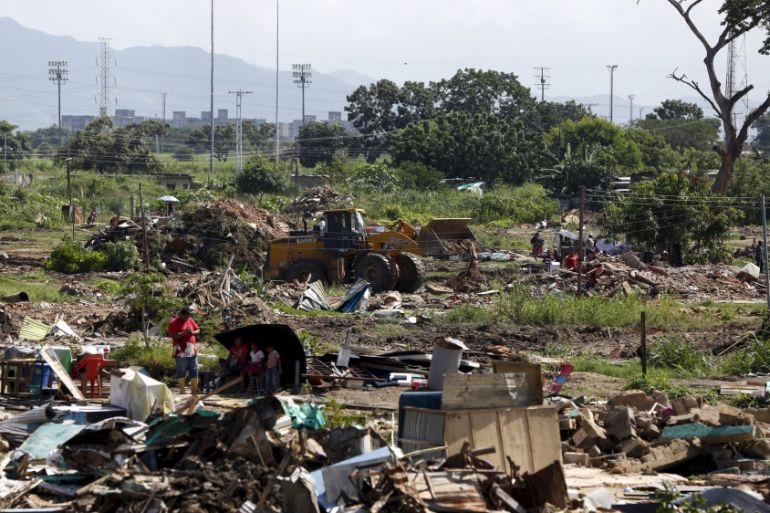Venezuelan police accused of abuses in gang crackdown
Police raids in poor areas during anti-crime initiative lead to allegations of “serious abuses”, rights groups say.

Caracas, Venezuela – On July 13, 2015, the Jimenez family was woken up by furious banging on their door. Outside their cinder block and zinc home, precariously perched on a hillside slum in western Caracas, dozens of troops were searching through homes and taking men away.
It was 3am, but the raids would go on until a little after 2pm.
Keep reading
list of 4 itemsArmourer for the film Rust sentenced to 18 months in fatal on-set shooting
Six takeaways from first day of Trump’s New York hush money criminal trial
‘Obvious’ Sydney mall killer targeted women, Australian police say
As two of Luis Jimenez’s sons were taken away, Venezuela was waking up to Operation Free the People (OLP), the latest attempt by President Nicolas Maduro to solve the country’s soaring crime rates.
On that day, about 200 men were arrested and 15 people were killed.
“They accused my boys of being thugs and took them. They also took my sons’ laptops and mobile phones. Who are the thugs?” says Jimenez, whose sons were released later that night.
READ MORE: Rival protests in Venezuela amid economic crisis
When we visited the community days after the OLP had taken place, people described scenes of terror where whole homes were upturned, personal belongings destroyed or stolen, and men beaten and detained arbitrarily by security forces.
Amid smashed TV sets and upturned cupboards, residents of the Cota 905, the shanty town where that first raid took place, complained of having no one to turn to for news about their loved ones – the idea of having stolen property returned wasn’t even something they deemed possible.
‘Serious abuses’
On Monday, Human Rights Watch (HRW) and a local human rights organisation, Provea, presented a report detailing some of the same accounts we heard that day.
The two groups said the actions by the state’s security forces constituted serious abuse of power by the very same institutions that should serve as guarantors of peace.
READ MORE: Venezuela, the world’s worst-performing economy
The report, presented at the Inter-American Commission on Human Rights meeting in Washington, also claimed that there were at least 20 extrajudicial killings during the past year.
|
|
“Venezuelans … urgently need protection from violent crime but in multiple raids throughout the country, the security forces themselves have allegedly committed serious abuses – including unlawful killings – in the very communities that need their protection,” said Jose Miguel Vivanco, HRW’s Americas director.
The government has said 245 people, including three policemen, have been killed in the dozens of OLP raids that have taken place across the country since that morning in July. It says the deaths took place during armed clashes between criminals and security forces.
But HRW and Provea countered this claim, arguing that the disparity in deaths between criminals and security forces pointed instead to killings that occurred with no confrontation.
‘It’s been almost a year’
For Dellanirys Villadiego, a resident at the Cota 905 slum, the worst aspect of the OLP raids is their arbitrary nature.
Dellanirys’ two brothers were taken from their home in the July raid. She has yet to know why, and what will ultimately happen to them. Unlike the Jimenez brothers, these young men are still behind bars and still awaiting trial.

“Their hearing was expected for March 29, but because of Easter week the judge said everything was delayed. It’s been almost a year,” Villadiego says.
Venezuela is one of the most dangerous countries in the world, with one of the highest murder rates globally, according to the UN.
Its exact homicide rate is unknown because the government stopped publishing figures more than three years ago. According to local watchdog groups, however, it can be as high as 82 per 100,000 people.
But crime is fast evolving and civilians are no longer the sole target. Reports of hand-grenades being thrown at police quarters are more frequent, as are carefully orchestrated assaults by large armed groups that take over and “impose curfews” on whole communities.
The government has said that crime is the result of capitalism, or, in their words, “of people wanting more things”.
Lately, Maduro has said that crime has soared because of paramilitary groups with links to the Colombian far-right who have infiltrated the country and are seeking to overthrow his government.
In September, in another case reported by HRW and Provea, the Venezuelan government expelled almost 1,200 undocumented Colombian immigrants after closing the border. Their homes were bulldozed overnight.
According to the two human rights groups, many of those people were in Venezuela on refugee status.
Back in Cota 905, Jimenez is trying to piece his life – and his home – back together.
Yet, his hope in a government that was once widely supported by communities such as his seems harder to recover.
“Crime in this area is even worse now than it was before,” he says. “There is no government here, so I don’t know who can ever stop this madness.”